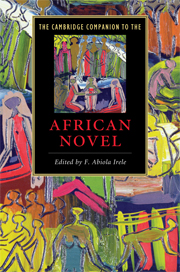Book contents
- Frontmatter
- 1 Introduction: perspectives on the African novel
- 2 The oral-literate interface
- 3 Chinua Achebe and the African novel
- 4 Protest and resistance
- 5 The Afrikaans novel
- 6 The African novel in Arabic
- 7 The francophone novel in North Africa
- 8 The francophone novel in sub-Saharan Africa
- 9 The African historical novel
- 10 Magical realism and the African novel
- 11 The African novel and the feminine condition
- 12 Autobiography and Bildungsroman in African literature
- 13 The postcolonial condition
- 14 New voices, emerging themes
- 15 The critical reception of the African novel
- Bibliography
- Index
13 - The postcolonial condition
Published online by Cambridge University Press: 28 January 2010
- Frontmatter
- 1 Introduction: perspectives on the African novel
- 2 The oral-literate interface
- 3 Chinua Achebe and the African novel
- 4 Protest and resistance
- 5 The Afrikaans novel
- 6 The African novel in Arabic
- 7 The francophone novel in North Africa
- 8 The francophone novel in sub-Saharan Africa
- 9 The African historical novel
- 10 Magical realism and the African novel
- 11 The African novel and the feminine condition
- 12 Autobiography and Bildungsroman in African literature
- 13 The postcolonial condition
- 14 New voices, emerging themes
- 15 The critical reception of the African novel
- Bibliography
- Index
Summary
The notion of the postcolonial gained currency as a category of experience in the Western academy during the 1980s, roughly two decades after decolonization in Africa, in the wake of Edward Said’s seminal work Orientalism (1978). Said’s impressive survey of Western representations of the Orient inspired critics and theorists across many fields because of the way he linked up the politics of institutions and discursive formations with the cultural use of power and knowledge. This English literature professor of Palestinian origin helped initiate a paradigmatic shift away from criticism narrowly focused on texts and their formal aspects to the study of literature in its multiple contexts. This broadening of the critic’s scope to allow for a consideration of the dynamics of empire was consolidated over the next decade with a number of collaborative efforts of which The Empire Writes Back: Theory and Practice in Post-Colonial Literatures (1989) by Bill Ashcroft, Gareth Griffiths, and Helen Tiffin stands out as a noteworthy example. Rhetorical features of postcolonial discourse such as mimicry and hybridity proposed in The Empire Writes Back were subsequently expanded and refined by critics such as Homi Bhabha in The Location of Culture (1994). Bhabha and the authors of The Empire Writes Back were also professors of English, which signals how important English departments were in shaping the emergence of postcolonial studies, but it is also useful to remember that French post-structuralism provided much of the theoretical basis from which they developed their common project.
- Type
- Chapter
- Information
- The Cambridge Companion to the African Novel , pp. 209 - 226Publisher: Cambridge University PressPrint publication year: 2009
- 3
- Cited by



